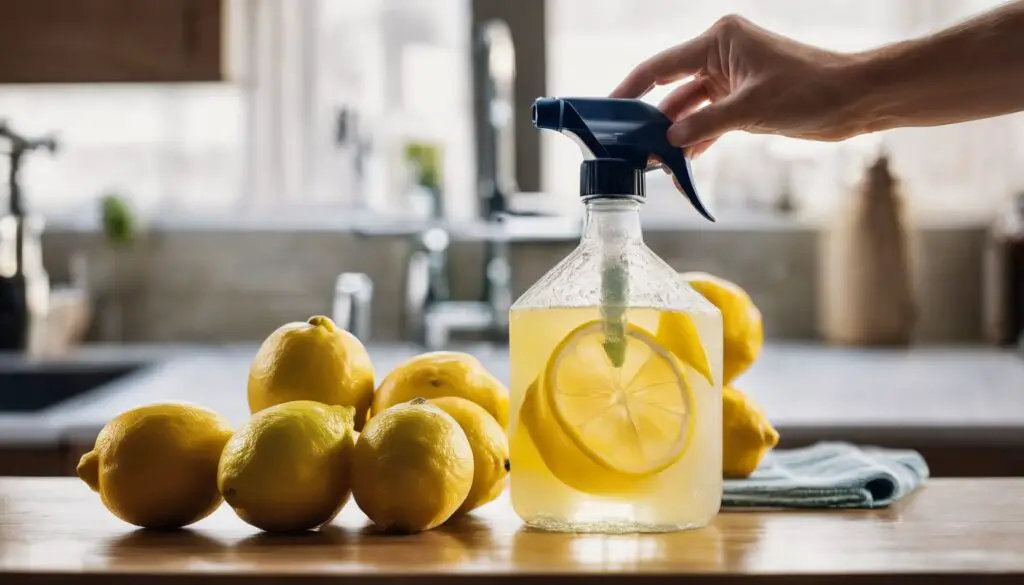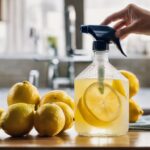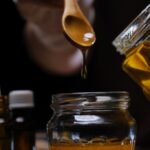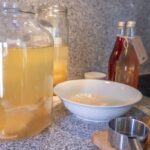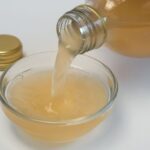Have you ever wondered what happens when you mix vinegar and lemon juice are combined? Well, you may be surprised to learn this duo can create a natural, potent cleaning solution! This blog will guide you through the amazing benefits of using vinegar and lemon for cleaning, explain recipes to whip up your own cleaning solutions at home, and give precautions about its use.
Stay with us as we delve into this incredible kitchen chemistry experiment for a greener clean.
Key Takeaways
- Mixing vinegar and lemon juice creates a natural and effective cleaning solution with antibacterial properties.
- Vinegar and lemon juice are safe, non – toxic ingredients that can be used to clean various surfaces in your home.
- You can clean your coffee maker, microwave, bathroom, and shower using a mixture of vinegar and lemon juice. However, avoid using it on marble or brass surfaces as it may cause damage.
- When mixing vinegar and lemon juice for cleaning purposes, never mix them with bleach as it can release toxic gas.
Cleaning with Vinegar and Lemon Juice: A Natural Solution
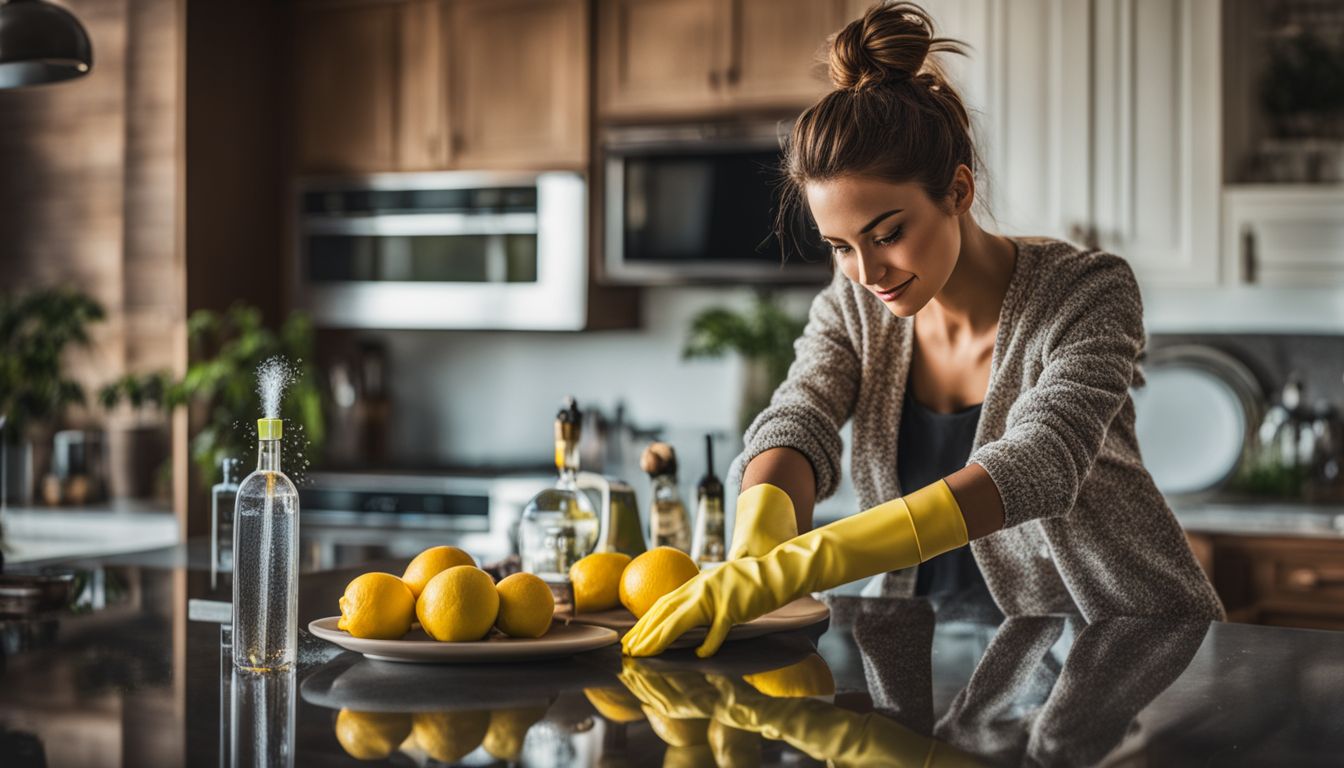 Cleaning with vinegar and lemon juice is a natural and effective way to tackle household dirt and grime.
Cleaning with vinegar and lemon juice is a natural and effective way to tackle household dirt and grime.
The benefits of using lemon and vinegar for cleaning
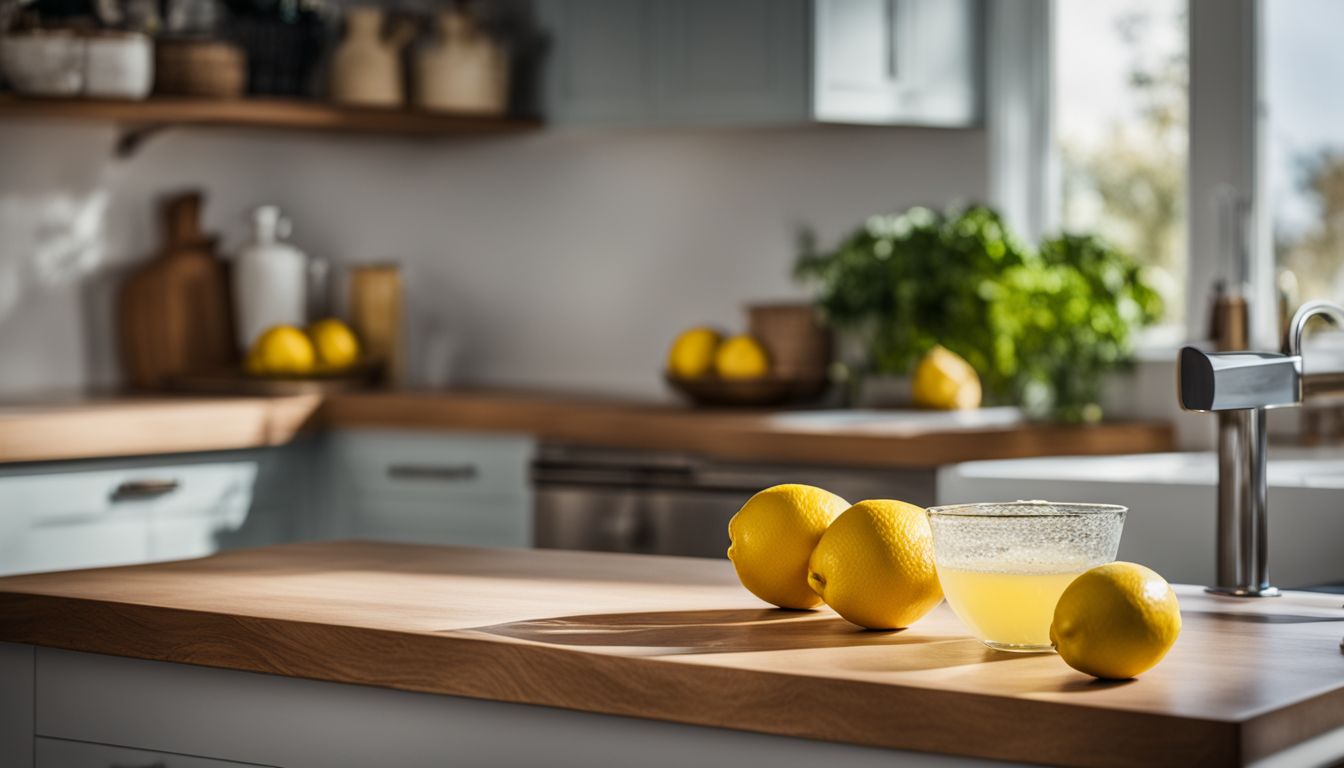
Lemon and vinegar make a strong cleaner. They both fight germs well. This is because they are very acidic. The acid kills many types of bacteria. Lemon juice and vinegar can safely clean your home, unlike some cleaners with harsh chemicals.
Even better, these items often live in your kitchen already! But, don’t mix them with bleach as this can make unsafe gas.
Safe and non-toxic ingredients
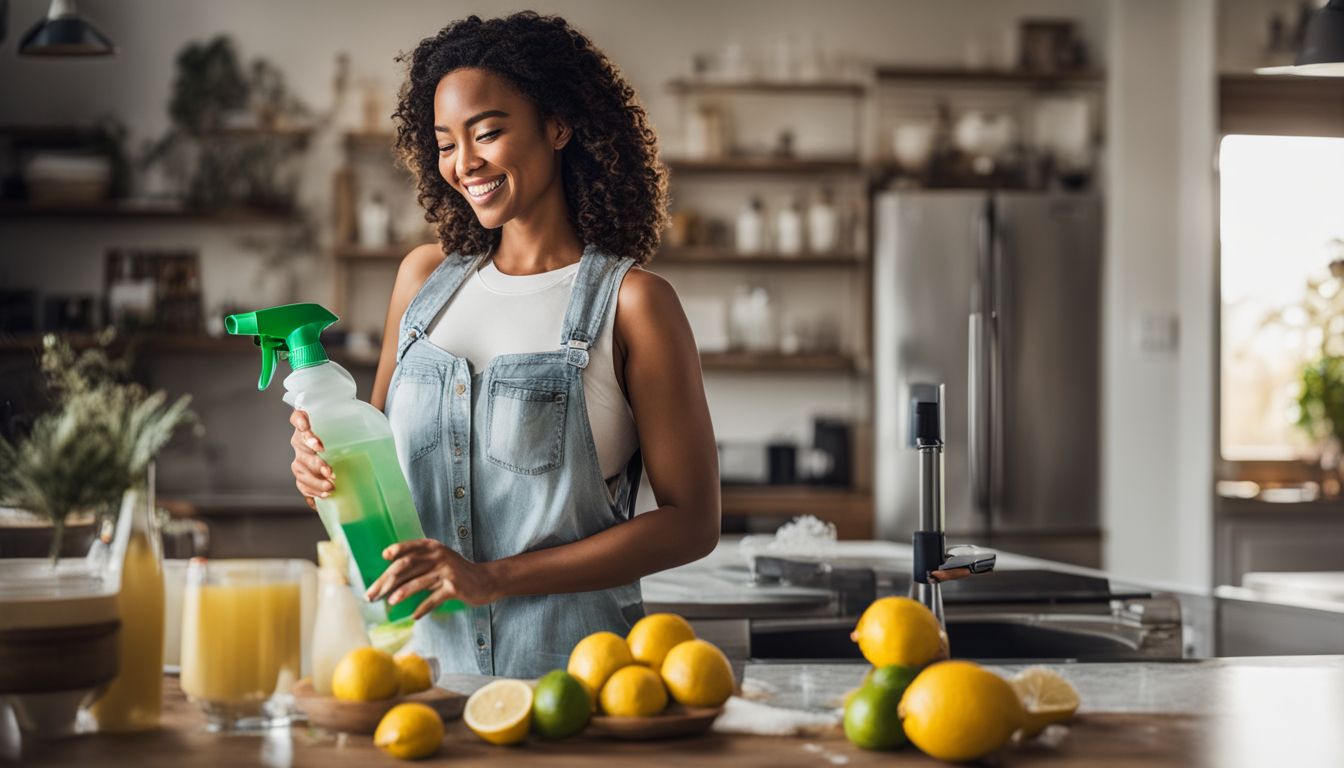
Vinegar and lemon juice are safe and non-toxic ingredients that can be used for cleaning. They are natural alternatives to harsh chemical cleaners, making them a great choice for those who want to create a healthier environment in their homes.
Distilled white vinegar is made from fermented ethanol, while lemon juice comes from squeezing fresh lemons. Both ingredients have antibacterial and antiseptic properties, which means they can effectively kill germs without the need for harmful chemicals.
This makes them especially useful for households with children or pets, as there is no risk of toxic fumes or residues left behind on surfaces. By using vinegar and lemon juice as cleaning solutions, you can keep your home clean and fresh while also prioritizing the safety of your loved ones.
What You Can Clean with Vinegar and Lemon Juice
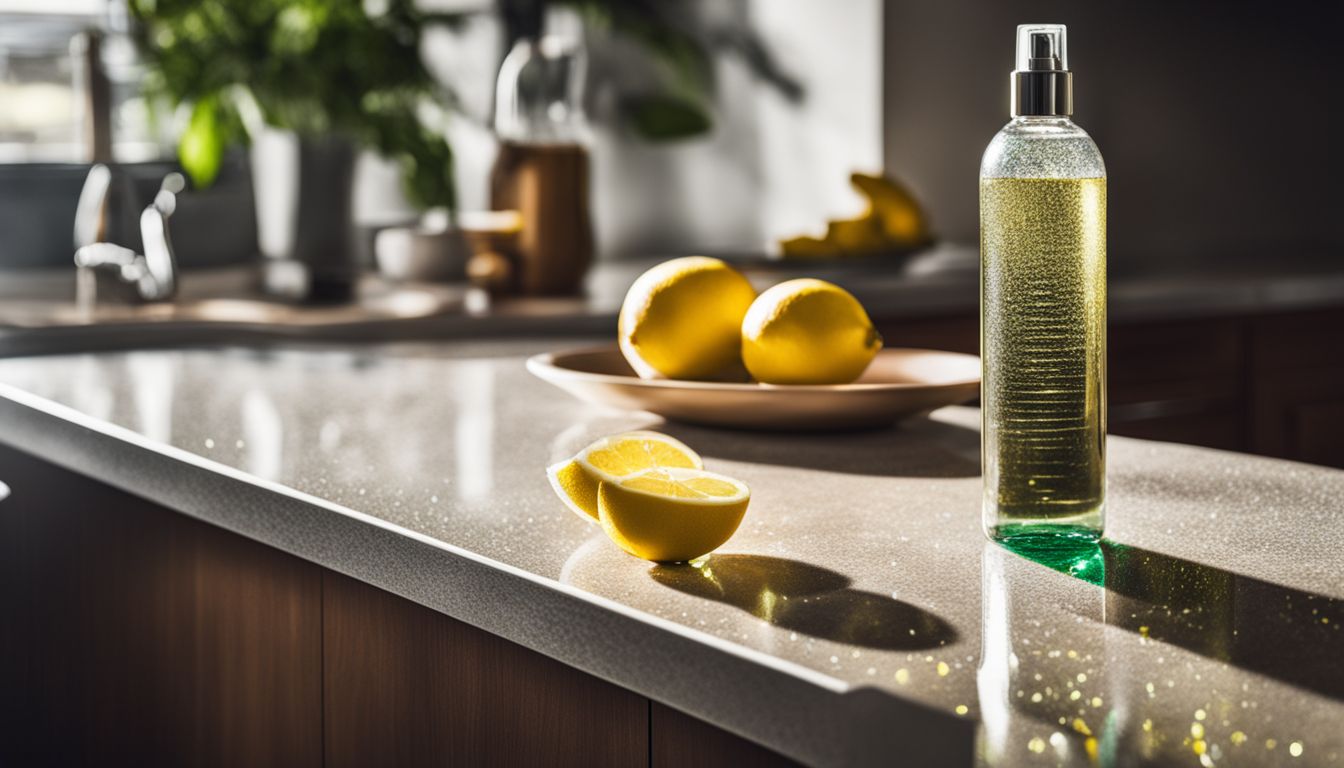
You can clean various items and surfaces with vinegar and lemon juice, including your coffee maker, microwave, bathroom, and shower.
Coffee maker
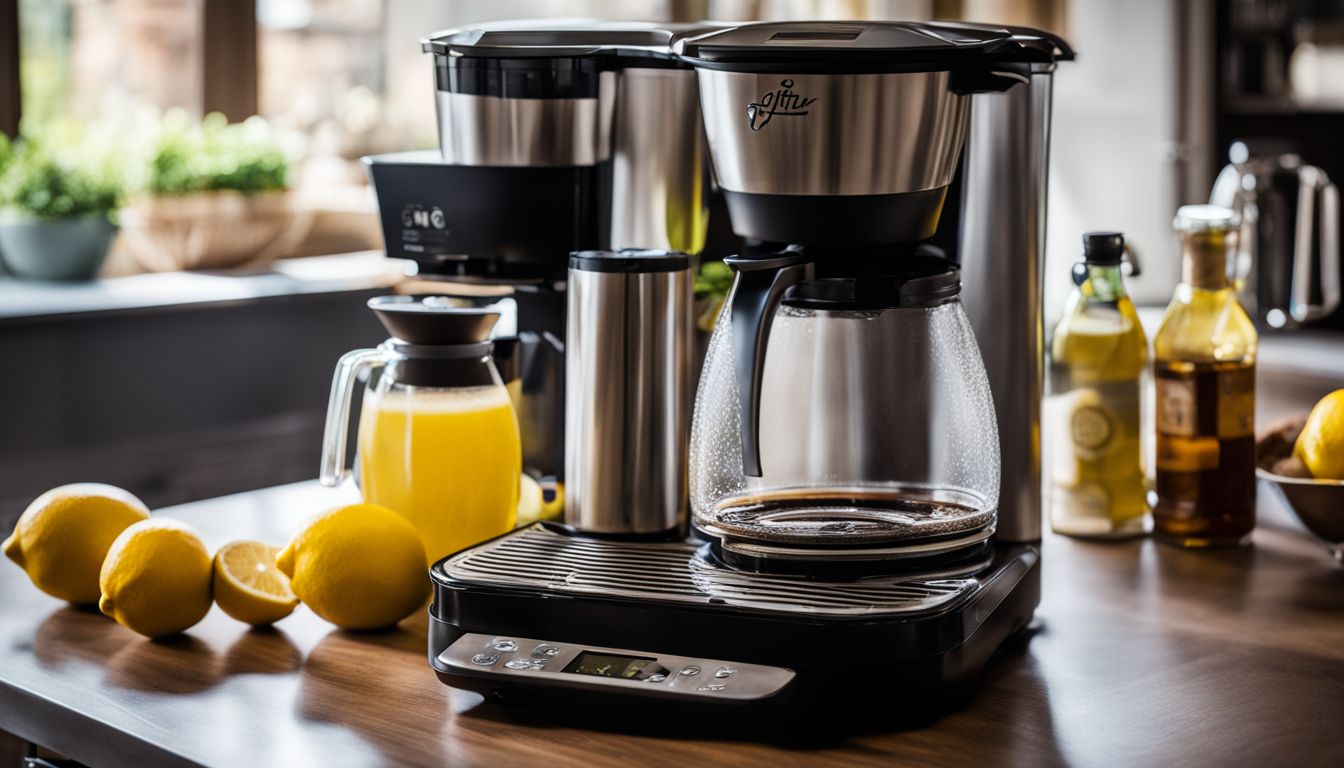
You can clean your coffee maker using a mixture of vinegar and lemon juice. This natural cleaning solution is safe and effective, removing mineral deposits and buildup from the machine.
Simply mix equal parts vinegar and lemon juice with water, then run it through a brewing cycle in your coffee maker. Afterward, rinse the machine thoroughly with water to remove any traces of the cleaning solution.
Regularly cleaning your coffee maker helps maintain its performance and ensures that you have a fresh-tasting cup of coffee every time.
Microwave
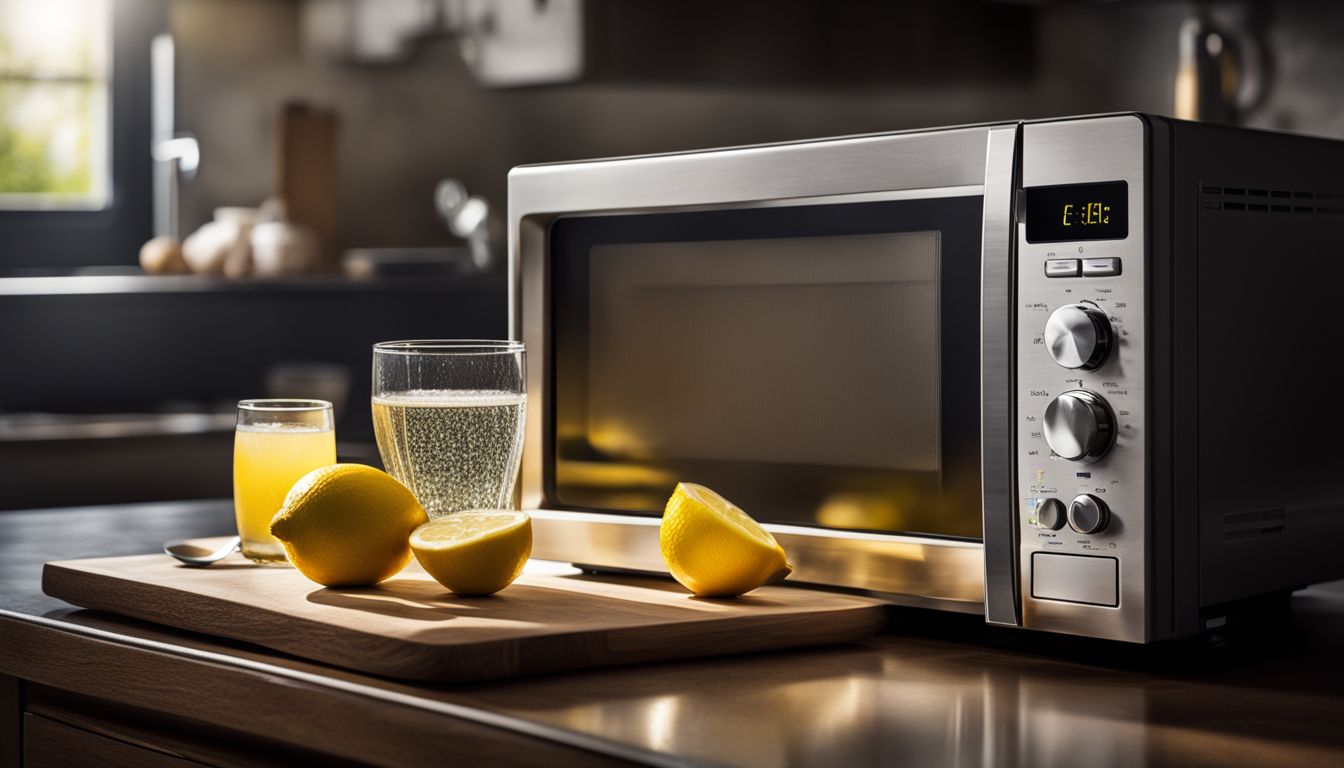
Cleaning your microwave can be quick and easy with a mixture of vinegar and lemon juice. The acidic properties in both ingredients help to break down grease and food stains, making it easier to wipe away dirt and grime.
Simply combine equal parts vinegar and lemon juice in a microwave-safe bowl, and heat it for a couple of minutes until it boils. The steam created will loosen stubborn residue inside the microwave, allowing you to effortlessly wipe it clean with a cloth or sponge.
This natural cleaning solution is not only effective but also safe to use, without any harmful chemicals or toxins that may linger on surfaces where food is prepared.
Bathroom and shower
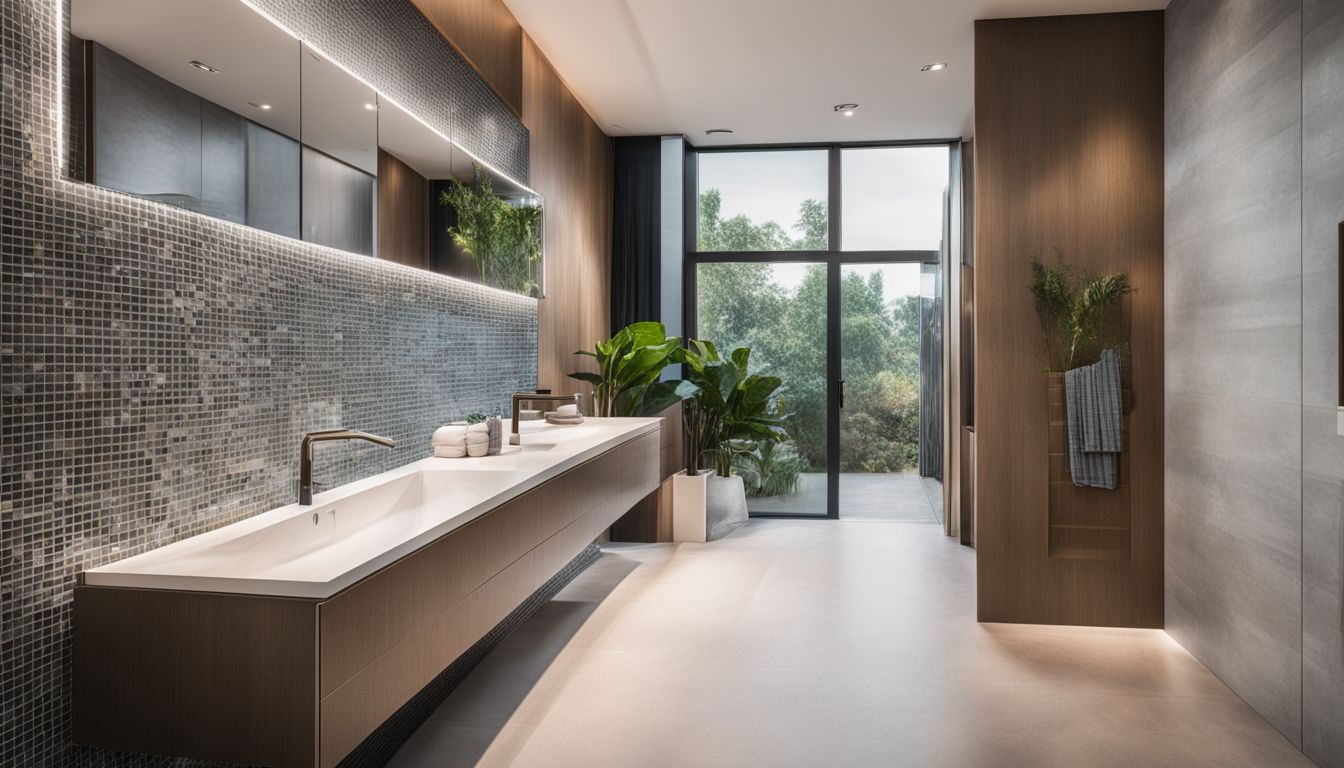
Vinegar and lemon juice can also be used to clean your bathroom and shower. These natural ingredients help remove soap scum, hard water stains, and mildew. You can make a simple cleaning solution by mixing equal parts vinegar and water or combining lemon juice with baking soda.
Apply the mixture onto the surfaces, scrub gently, then rinse off with water. Vinegar and lemon juice are safe for most bathroom surfaces like tiles, glass, porcelain, and chrome fixtures.
Just remember not to use them on marble or brass as they can cause damage. With this all-natural cleaning solution, you can keep your bathroom fresh and germ-free without any harmful chemicals!
How to Make a Cleaning Solution with Lemon and Vinegar
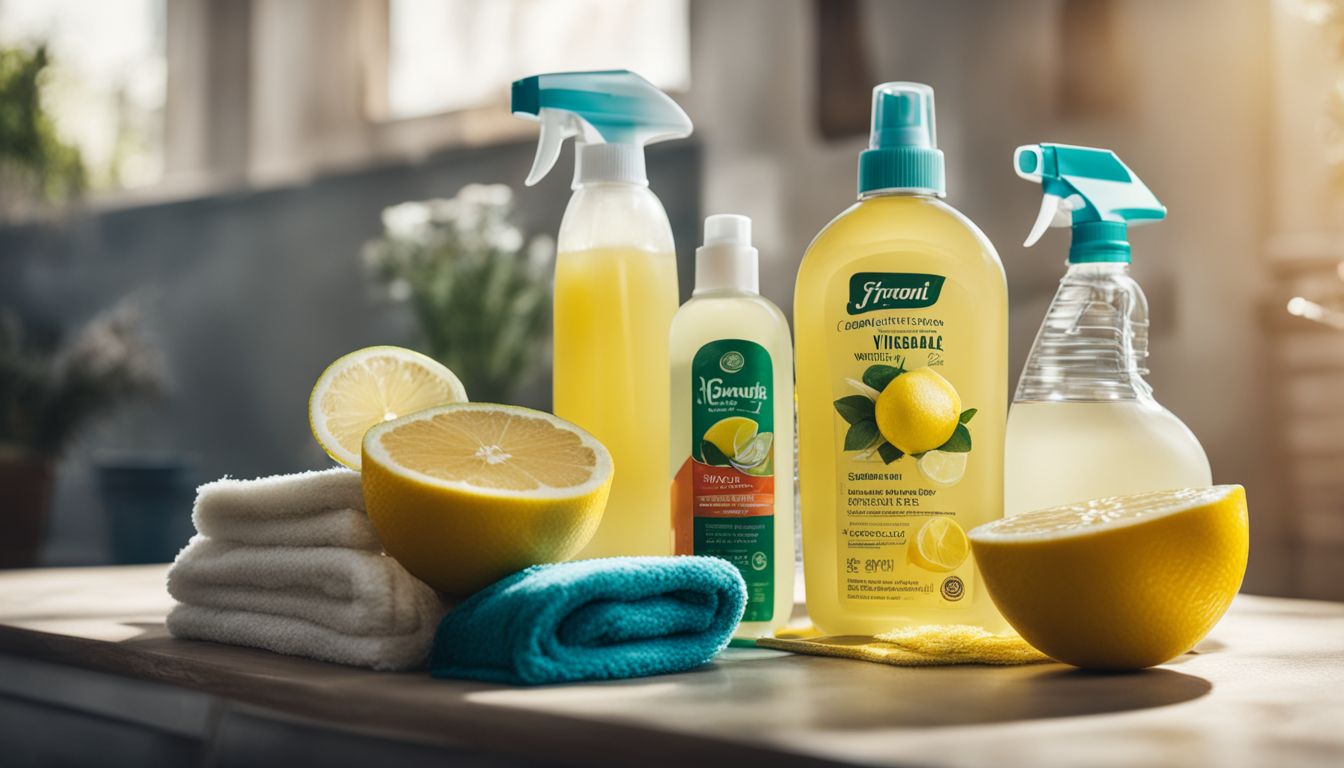
Create your own natural cleaning solution by combining equal parts lemon juice and distilled white vinegar.
Recipe for a vinegar and lemon cleaner
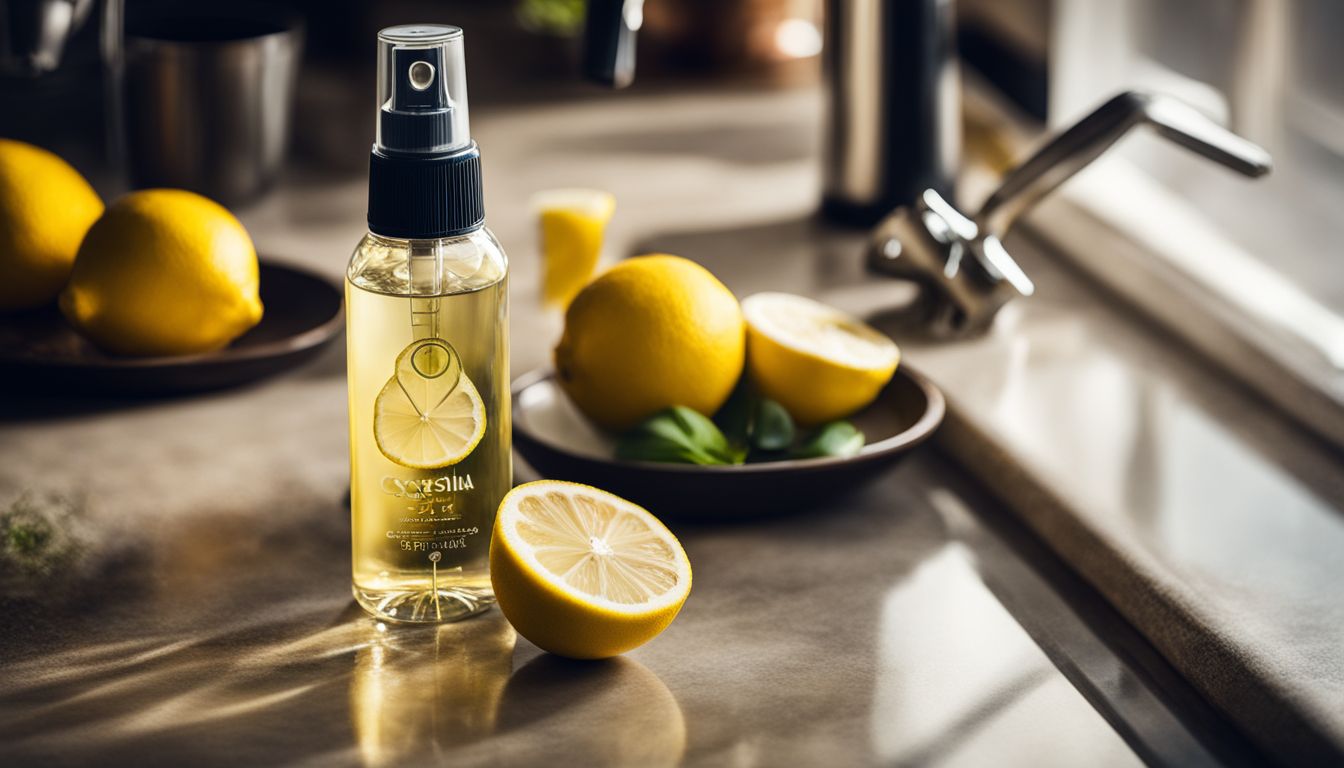
To make a vinegar and lemon cleaner, you’ll need two simple ingredients: distilled white vinegar and fresh lemon juice. Start by mixing equal parts of vinegar and lemon juice in a spray bottle.
For example, you can use half a cup of each. Give the bottle a good shake to combine the ingredients. Now your cleaning solution is ready to use! Simply spray it onto surfaces that need cleaning, like countertops or bathroom fixtures, and let it sit for a few minutes before wiping away with a cloth or sponge.
This homemade cleaner is effective at removing dirt, grime, and even some stains thanks to the acidic properties of both vinegar and lemon juice. Plus, it leaves behind a fresh citrus scent as an added bonus!
Tips and substitutions
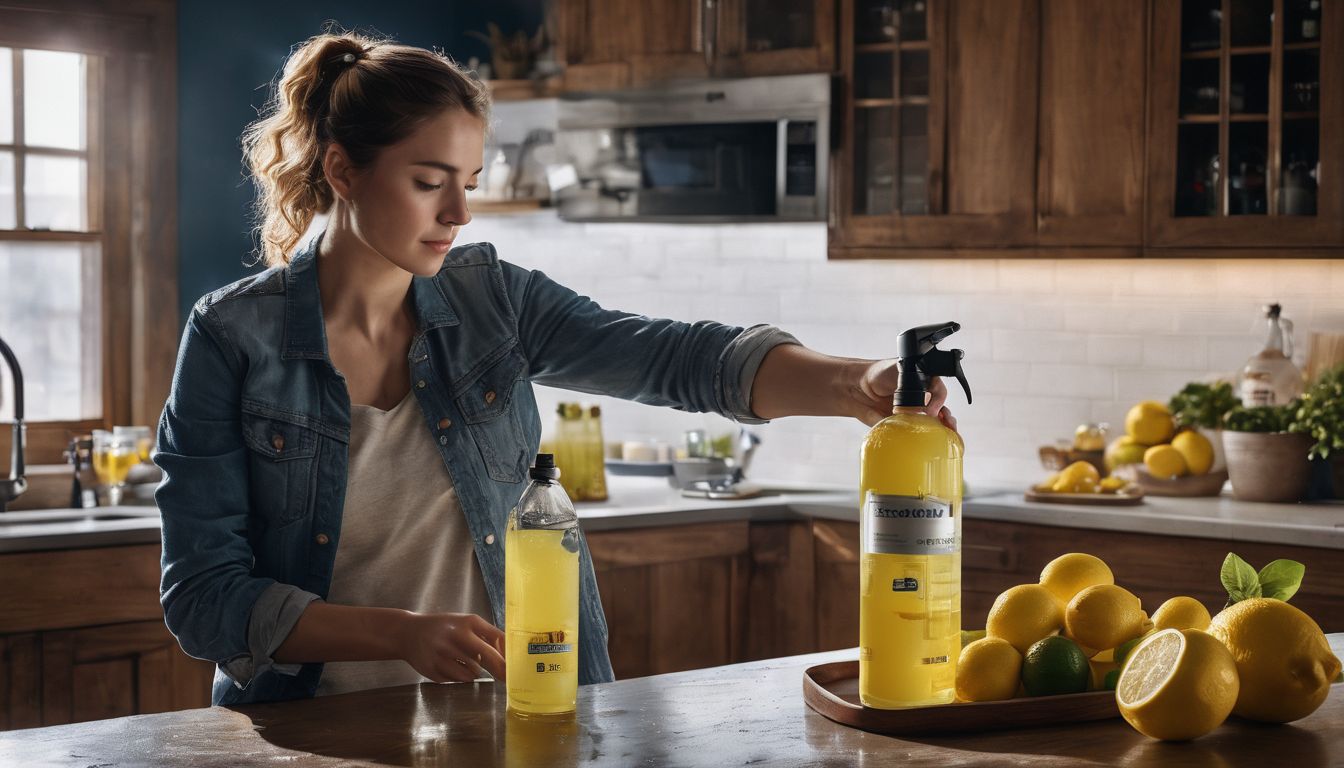
To make the most out of your vinegar and lemon juice cleaning solution, here are some helpful tips and substitutions for you to consider. Firstly, if you don’t have distilled white vinegar on hand, you can use apple cider vinegar as a substitute.
It will still have similar cleaning properties due to its acidity. Additionally, if you prefer a milder scent or want to add some extra antibacterial power, you can infuse your vinegar with citrus peels by leaving them in the jar for a few weeks before using.
Another tip is to mix baking soda with your lemon and vinegar solution for tougher stains or greasy surfaces. The combination of these ingredients can create a gentle scrubbing paste that effectively removes stubborn dirt and grime.
Can I mix vinegar and lemon juice to make a cleaning solution?
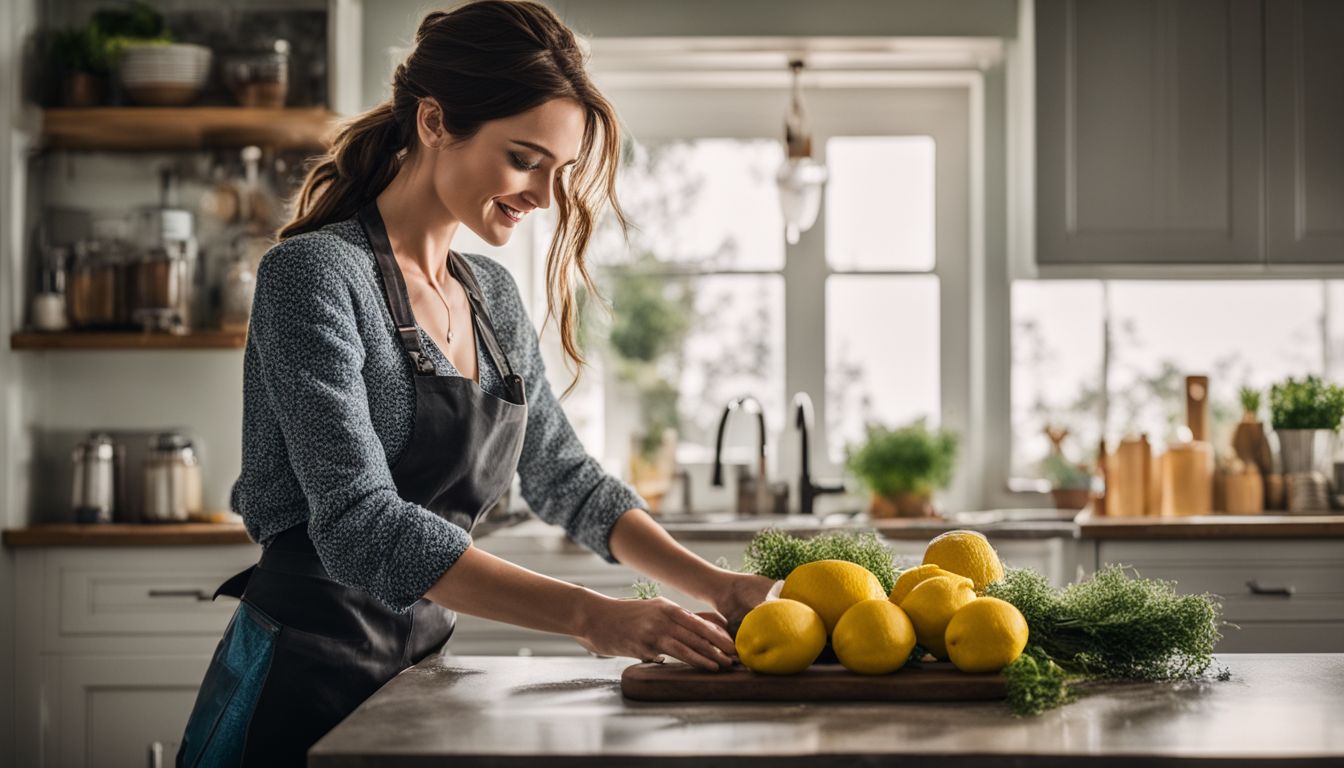
Can I mix vinegar and lemon juice to make a cleaning solution? Yes, you can! Mixing vinegar and lemon juice creates a natural and effective cleaning liquid. It’s important to note that the combination of vinegar and lemon juice does not kill bacteria on its own.
However, the acidity of these ingredients helps in breaking down stains and residue on surfaces. You can use this mixture to clean various areas in your home such as your coffee maker, microwave, bathroom, and shower.
Just remember not to mix lemon juice with bleach as it can release toxic chlorine gas. Also, avoid using this cleaning solution on certain surfaces like marble or brass as the acidity may cause damage.
Precautions When Using Lemon and Vinegar
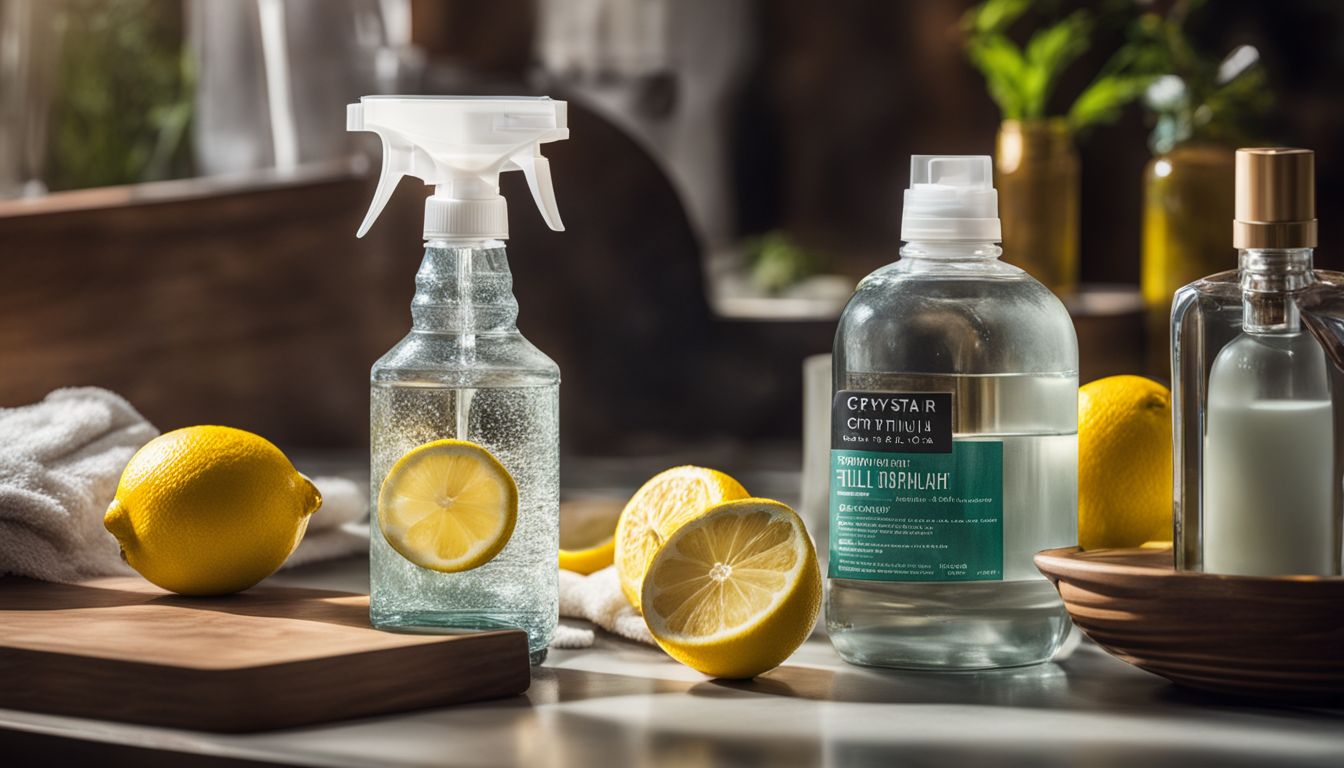
Mixing lemon juice and vinegar can create a potent cleaning solution, but it’s important to exercise caution. Read on to learn about the precautions you should take when using these ingredients for cleaning purposes.
Do not mix with bleach
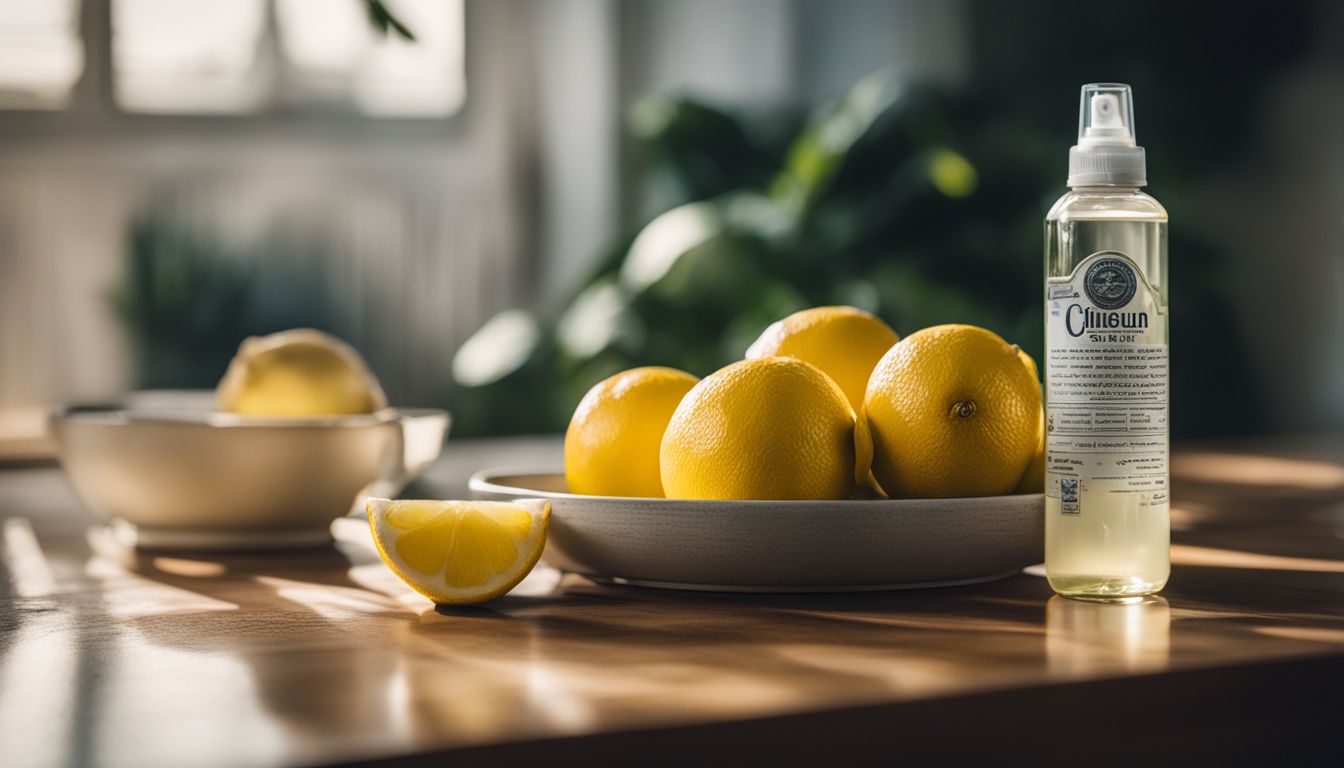
Mixing vinegar and lemon juice can create a powerful cleaning
solution, but there is one important caution. It’s crucial to never mix vinegar and lemon juice with bleach. This combination can release toxic chlorine gas which can be harmful when inhaled.To ensure your safety, always keep these ingredients separate when cleaning or disinfecting your home.
Avoid using on certain surfaces (marble, brass)
-119489499.jpg)
To keep your surfaces looking their best, it’s important to avoid using the vinegar and lemon juice cleaning solution on certain materials like marble and brass. This is because the acidic properties of vinegar and lemon juice can cause damage to these delicate surfaces.
The acid can etch or discolor the marble, leaving behind unsightly marks. Similarly, when used on brass, the acid can tarnish or corrode the metal. So, be cautious and choose alternative cleaning solutions for these specific surfaces to maintain their shine and beauty.
Conclusion
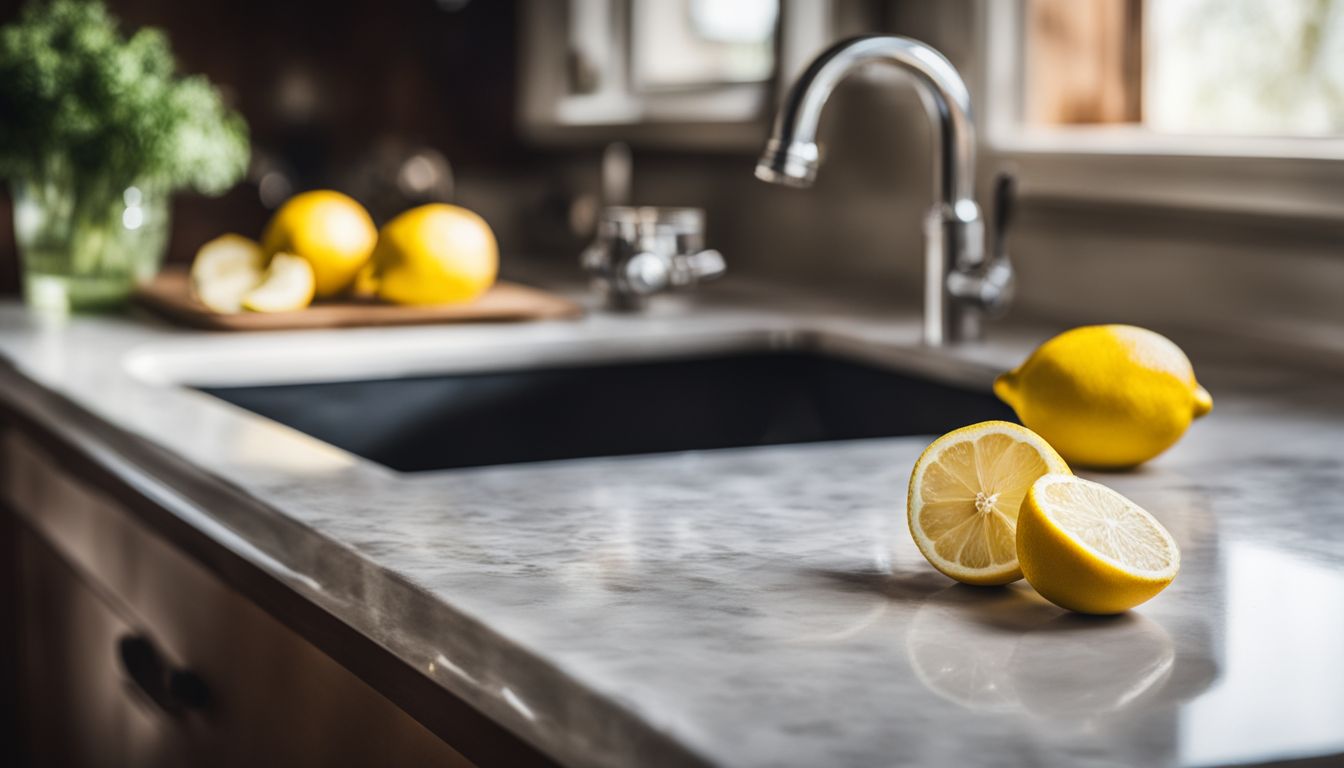
In conclusion, when you mix vinegar and lemon juice, you create a potent cleaning solution that is safe, non-toxic, and effective. This natural combination has antibacterial properties and can be used to clean various surfaces in your home.
So harness the power of nature and try using vinegar and lemon juice for all your cleaning needs!
FAQs
1. What happens when you mix vinegar and lemon juice?
When you mix vinegar and lemon juice, it forms an acidic substance that has strong germbusting properties useful for cleaning.
2. Can I use a blend of vinegar and lemon juice to clean my home?
Yes! A mixture of vinegar and lemon juice makes a great natural cleaning agent. Many people make homemade cleaning spray with these two items.
3. How does the mixture work as a cleaner?
The acidic substances in both the citrus fruits like lemons, and in vinegar, have antibacterial properties; they can kill germs in your home.
4. Do I need special ingredients to create this cleaner at home?
No, all you need is some kitchen items: just take some fresh lemons for the citrus part and any kind of vinegar will do!
5. Is there any other benefit from mixing vinegar with lemon besides cleaning?
Aside from disinfecting homes safely without toxic stuff, these food preservatives are also used by cooks for their special acid-base reactions.

As a dedicated mother and passionate software developer, she weaves her diverse experiences into captivating stories that inspire and engage readers. Emma's love for sustainable living and environmental consciousness permeates both her personal and professional life. When she's not immersed in the world of coding and software development, Emma can be found nurturing her family and tending to her thriving organic garden. Her commitment to sustainable practices extends to every aspect of her life, from repurposing household items to embracing eco-friendly technologies.

